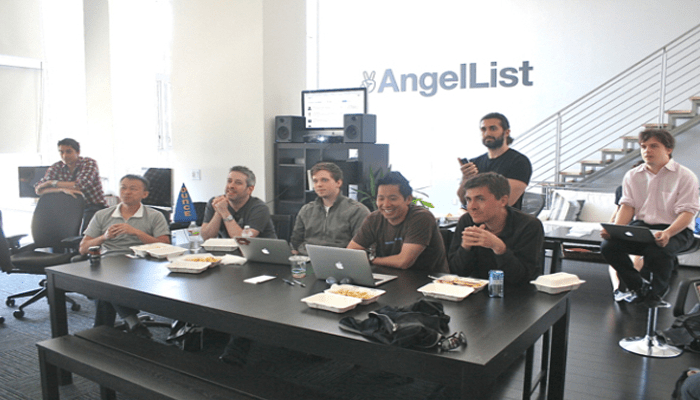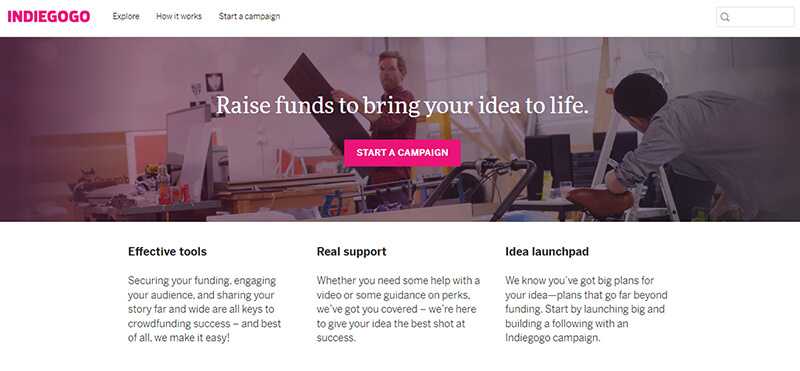In her book Cash From the Crowd, Sally Outlaw, founder, and CEO of crowdfunding website Peerbackers, reveals the secrets of funding your business with help from colleagues, peers, family, friends, and even perfect strangers through a crowdfunding campaign. In this edited excerpt, the author offers details on some crowdfunding websites that offer entrepreneurs the opportunity to generate funds for their new venture.
New crowdfunding platforms launch every day, so I’m only citing a few select ones that, in my experience, have the best track records, have been around long enough to build traction and a good reputation, and can be used to fund businesses. There are many reputable platforms, however, and a directory of crowdfunding platforms.
Reward:
1. Indiegogo
Originally launched with a focus on film, Indiegogo pivoted to include funding for literally anything and is becoming known for financing personal and cause-related campaigns such as that for the bullied bus monitor, which raised over $700,000. It accepts all projects without review.
As Indiegogo says on its website, “Our platform is available to anyone, anywhere, to raise money for anything.” While its success fee of 4 percent is 1 percent lower than most websites (which charge 5 percent), it does charge one of the highest fees in the industry — 9 percent — if you don’t meet your goal.
2. RocketHub
Initially launched with the arts in mind, Rockethub expanded to include science, education, business, and social good projects. It gained traction in the sciences with its annual SciFund Challenge, an online effort to fund science projects. It also launched a partnership with A&E Networks through which some select projects will be chosen to receive extra support from the joint initiative.
3. Peerbackers
Consistently recognized as one of the top crowdfunding websites in the industry, Peerbackers, which I co-founded and run, focuses on funding entrepreneurs and innovators. The platform has hosted thousands of creative, civic, and entrepreneurial projects from around the world and recently expanded to include young entrepreneurs ages 13 to 17 through partnerships with student organizations.
After seeing such a high industry failure rate for crowdfunding projects, peer backers launched Crowdfunding Academy to offer education and support to those who want to crowdfund.
4. Kickstarter
The most well-known of the crowdfunding websites, Kickstarter focuses on creative endeavors including design, the arts (film, publishing, music), gaming, and technology. While Kickstarter can’t be used to fund businesses per se, it does accept products and has had some remarkably successful campaigns, including about 50 that have generated over a million dollars in funding.
Kickstarter “curates” its projects, meaning it has a rigorous submission process, and if you aren’t approved to post, it can be quite disappointing.
Indiegogo, RocketHub, and peerbackers are open to project creators around the world. Kickstarter only accepts project creators from the U.S., U.K., and Canada.
Debt:
5. SoMoLend
A peer-to-peer platform, it facilitates friends-and-family loans, accredited investor loans, and bank loans to business borrowers looking for funding. The website targets brick-and-mortar companies that already have customers and cash flow and can service debt. Typically it looks for a business that’s at least a year old and has at least a year’s worth of receipts.
Unlike most business lenders, SoMoLend doesn’t rely heavily on FICA scores. It considers numerous factors, both traditional and nontraditional (social reputation and behavior, Klout score, and online presence), to determine a rating that predicts what interest rate you’ll be asked to pay from those who back the loans. SoMoLend anticipates opening up the funding of its loans to the general public in early 2014 when the JOBS Act is fully implemented.
6. Endurance Lending Network
Endurance Lending Network is a web-based lending platform that connects small businesses looking for up to $500,000 of debt capital with nontraditional lending sources (accredited individuals, family offices, wealth management platforms, debt funds, etc.).
It aggregates and filters the opportunities into investment pools using web-based onboarding and a sophisticated credit algorithm that is much different and more effective for entrepreneurs than those that banks use.
7. Equity Investment
The backers at these websites are accredited investors and not yet “crowds” of everyday Americans, so these platforms might not fit the typical definition of crowdfunding. However, these websites do permit accredited investors to back projects at lower investment thresholds (e.g., $1,000, $5,000 per investor), so they employ the “pooling” and online elements of crowdfunding.
8. Grow Venture Community.
One of the first global, community-based platforms dedicated to entrepreneurs and investors, Grow VC enables great ideas to get visibility with the right investing audience and early support. Grow VC is more than crowdfunding— it’s an ecosystem where entrepreneurs can connect with experts, funders, team members, new customers, and partners to realize their ideas.
9. MicroVentures.
MicroVentures calls itself an “investment bank for startups.” It conducts due diligence on startups and then, if approved, helps raise capital from angel investors via its SEC-approved online platform, giving angel investors the ability to invest small amounts of capital to crowdfund a startup.
10. Angel List
What is known as Match.com for early-stage startups and investors has rolled out an equity crowdfunding service. It’s not for every entrepreneur — you must have already raised $100,000 in seed funding and be incorporated in Delaware — but Angel List has a convenient system that taps into its strong investor pool.
It also has the advantage of putting all backers into a single-purpose fund — a benefit for any entrepreneur needing to seek future funding as venture capitalists wouldn’t have to manage multiple individuals who previously invested.
Alternate 10.CircleUp
A niche equity website with a focus on high-growth consumer products and retail companies, CircleUp has partnered with Procter & Gamble and General Mills to offer more value beyond the funding, giving entrepreneurs access to these brands. There is no fee for investments from friends and family. CircleUp charges a fee only if you raise capital with a listing on its website from new investors subscribing via its broker partner WR Hambrecht + Co.



